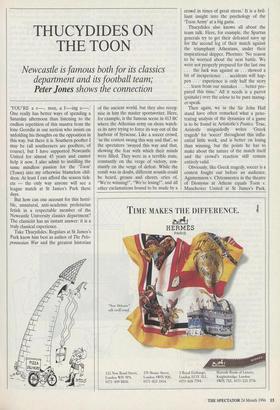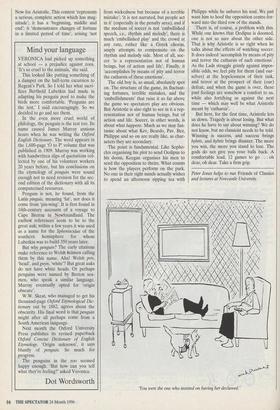THUCYDIDES ON THE TOON
Newcastle is famous both for its classics department and its football team; Peter Jones shows the connection `YOU'RE a c—, man, a f—ing One really has better ways of spending a Saturday afternoon than listening to the endless repetition of this mantra from the lone Geordie in our section who insists on unfolding his thoughts on the opposition in this way, but there it is. Southern poofter I may be (all southerners are poofters, of course), but I have supported Newcastle United for almost 45 years and cannot help it now. I also admit to instilling the same mindless passion for the 'Toon' (Town) into my otherwise blameless chil- dren. At least I can afford the season tick- ets — the only way anyone will see a league match at St James's Park these days.
But how can one account for this horri- ble, unnatural, anti-academic proletarian fetish in a respectable member of the Newcastle University classics department? The classicist has an instant answer: it is a truly classical experience.
Take Thucydides. Regulars at St James's Park know him best as author of The Pelo- ponnesian War and the greatest historian of the ancient world, but they also recog- nise in him the master sportswriter. Here, for example, is the famous scene in 413 BC where the Athenian army on shore watch- es its navy trying to force its way out of the harbour of Syracuse. Like a soccer crowd, `as the contest swung this way and that', so the spectators 'swayed this way and that, showing the fear with which their minds were filled. They were in a terrible state, constantly on the verge of victory, con- stantly on the verge of defeat. While the result was in doubt, different sounds could be heard, groans and cheers, cries of, "We're winning!", "We're losing!", and all other exclamations bound to be made by a crowd in times of great stress.' It is a bril- liant insight into the psychology of the `Toon Army' at a big game.
Thucydides also knows all about the team talk. Here, for example, the Spartan generals try to get their defeated navy up for the second leg of their match against the triumphant Athenians, under their inspirational skipper, Phormio: 'No reason to be worried about the next battle. We were not properly prepared for the last one . . . the luck was against us . . . showed a bit of inexperience . . . accidents will hap- pen . . . experience is only half the story . . . learn from our mistakes . . better pre- pared this time.' All it needs is a parrot (psittake) over the selene to be pure manag- er-speak.
Then again, we in the Sir John Hall stand have often remarked what a pene- trating analysis of the dynamics of a game is to be found in Artistotle's Poetics. True, Aristotle misguidedly writes 'Greek tragedy' for 'soccer' throughout this influ- ential little work, and is better on losing than winning, but the points he has to make about the nature of the match itself and the crowd's reaction still remain entirely valid.
Obviously, like Greek tragedy, soccer is a contest fought out before an audience. Agamemnon v. Clytemnestra in the theatre of Dionysus at Athens equals Toon v. Manchester United at St James's Park. Now for Aristotle. This contest 'represents a serious, complete action which has mag- nitude'; it has a 'beginning, middle and end'; it 'demonstrates changes of fortune in a limited period of time', arising 'not from wickedness but because of a terrible mistake'; 'it is not narrated, but people act in it' (especially in the penalty area); and if the medium of soccer is not 'embellished speech, i.e., rhythm and melody', there is much 'embellished play' and the crowd at any rate, rather like a Greek chorus, amply attempts to compensate on the rhythm and melody side. Most of all, soc- cer 'is a representation not of human beings, but of action and life'. Finally, it `accomplishes by means of pity and terror the catharsis of these emotions'.
The old boy is, as usual, absolutely spot on. The structure of the game, its fluctuat- ing fortunes, terrible mistakes, and the `embellishments' that raise it so far above the game we spectators play are obvious. But Aristotle is also right to see in it a rep- resentation not of human beings, but of action and life. Soccer, in other words, is about what happens. Much as we may fan- tasise about what Key, Beardo, Pay, Bez, Philippe and so on are really like, as char- acters they are secondary.
The point is fundamental. Like Sopho- cles organising his plot to send Oedipus to his doom, Keegan organises his men to send the opposition to theirs. What counts is how the players perform on the park. No one in their right minds actually wishes to spend an afternoon sipping tea with Philippe while he unbares his soul. We just want him to hoof the opposition centre-for- ward into the third row of the stands.
There is, of course, a problem with this. While one knows that Oedipus is doomed, one is not so sure about the other side. That is why Aristotle is so right when he talks about the effects of watching soccer. It does indeed 'accomplish by means of pity and terror the catharsis of such emotions'. As the Lads struggle grimly against impos- sible odds, we feel pity for them (and our- selves) at the hopelessness of their task, and terror at the prospect of their (our) defeat; and when the game is over, these past feelings are somehow a comfort to us, while also fortifying us against the next time — which may well be what Aristotle meant by 'catharsis'.
But here, for the first time, Aristotle lets us down. Tragedy is about losing. But what does he have to say about winning? We do not know, but no classicist needs to be told. Winning is success, and success brings hybris, and hybris brings disaster. The more you win, the more you stand to lose. The gods do not give you your balls back. A comfortable lead, 12 games to go . . . oh dear, oh dear. Take a firm grip.
Peter Jones helps to run Friends of Classics and lectures at Newcastle University.
`You were the one who insisted on having her declawed.'



























































 Previous page
Previous page